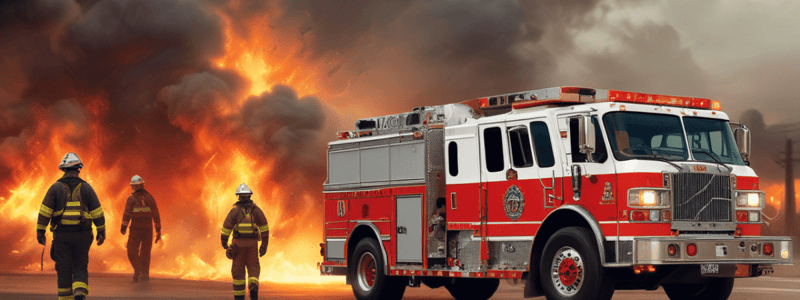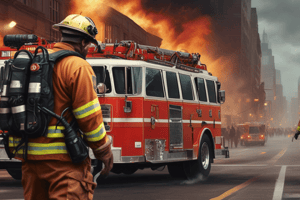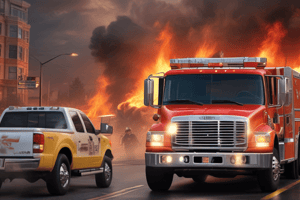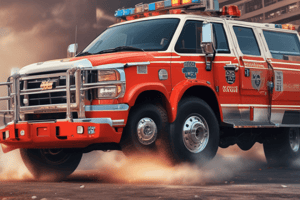Podcast
Questions and Answers
What is the primary purpose of the guideline for Toronto Fire Services (TFS) personnel?
What is the primary purpose of the guideline for Toronto Fire Services (TFS) personnel?
- To provide training for mass crowds, civil unrest and/or violent situations
- To establish a standardized approach to the safety of members
- To provide a guideline for responses to situations resulting from mass crowds, civil unrest and/or violent situations (correct)
- To maintain crews at a safe distance from potentially volatile situations
Who is responsible for ensuring the development of guidelines and training for incidents involving mass crowds, civil unrest and/or violent situations?
Who is responsible for ensuring the development of guidelines and training for incidents involving mass crowds, civil unrest and/or violent situations?
- The Division Chief of Technical Operations (correct)
- Local Law Enforcement Agency
- Incident Commanders
- Company Officers
What is the role of Incident Commanders in responding to situations involving mass crowds, civil unrest and/or violent situations?
What is the role of Incident Commanders in responding to situations involving mass crowds, civil unrest and/or violent situations?
- To develop guidelines and training for incidents involving mass crowds, civil unrest and/or violent situations
- To maintain crews at a safe distance from potentially volatile situations
- To assess risk of violence to all fire service personnel and liaise with law enforcement authorities (correct)
- To provide awareness level information for crews responding to mass crowd situations
What is the outcome of the collaboration between the fire department and local law enforcement agency/agencies?
What is the outcome of the collaboration between the fire department and local law enforcement agency/agencies?
What is the primary concern when maneuvering an apparatus in or near a large crowd?
What is the primary concern when maneuvering an apparatus in or near a large crowd?
What is a common occurrence in major urban centers?
What is a common occurrence in major urban centers?
Who is responsible for maintaining crews at a safe distance from potentially volatile situations?
Who is responsible for maintaining crews at a safe distance from potentially volatile situations?
What level of information does this guideline provide for crews responding to mass crowd situations?
What level of information does this guideline provide for crews responding to mass crowd situations?
What is the primary concern for the Incident Commander at incidents involving mass crowds, civil unrest and/or violent situations?
What is the primary concern for the Incident Commander at incidents involving mass crowds, civil unrest and/or violent situations?
Who shall the TFS Communication Centre notify when fire personnel are in attendance at incidents involving mass crowds, civil unrest and/or violent situations?
Who shall the TFS Communication Centre notify when fire personnel are in attendance at incidents involving mass crowds, civil unrest and/or violent situations?
What is the role of the Fire Incident Commander in relation to the Police at the incident scene?
What is the role of the Fire Incident Commander in relation to the Police at the incident scene?
What is the primary consideration for the Incident Commander in determining the appropriate level of personal protective equipment?
What is the primary consideration for the Incident Commander in determining the appropriate level of personal protective equipment?
What is prohibited for fire personnel when responding to incidents involving mass crowds, civil unrest and/or violent situations?
What is prohibited for fire personnel when responding to incidents involving mass crowds, civil unrest and/or violent situations?
What is the priority in a civil disturbance area?
What is the priority in a civil disturbance area?
What is the protocol for requesting Police attendance at an incident?
What is the protocol for requesting Police attendance at an incident?
What should the unit do if a fire apparatus is responding into an area of civil disturbance and hostility erupts unexpectedly?
What should the unit do if a fire apparatus is responding into an area of civil disturbance and hostility erupts unexpectedly?
What should the Company Officer do if they believe the apparatus or fire personnel will be in danger or attacked?
What should the Company Officer do if they believe the apparatus or fire personnel will be in danger or attacked?
What is the responsibility of the Incident Commander in the post-deployment phase of withdrawal?
What is the responsibility of the Incident Commander in the post-deployment phase of withdrawal?
Flashcards are hidden until you start studying
Study Notes
Purpose and Responsibility
- The purpose of this guideline is to provide a response protocol for Toronto Fire Services (TFS) personnel in situations involving mass crowds, civil unrest, and/or violent situations.
- All personnel are responsible for recognizing unsafe situations, and Company Officers are responsible for maintaining a safe distance from potentially volatile situations.
- Incident Commanders are responsible for assessing risk of violence to personnel and liaising with law enforcement authorities.
- The Division Chief of Technical Operations is responsible for developing guidelines and training for incidents involving mass crowds, civil unrest, and/or violent situations.
Guidelines
- The Technical Operations Division Chief is responsible for developing guidelines for TFS responses to incidents involving mass crowds, civil unrest, and/or violent situations.
- The fire department shall develop written standard operating procedures with local law enforcement agencies to establish a standardized approach to safety.
Awareness and Response
- Mass crowds are a common occurrence in urban centers, and care must be taken when maneuvering an apparatus in or near a large crowd.
- Incident Commanders shall take the following actions at incidents involving mass crowds, civil unrest, and/or violent situations:
- Get crews back a safe distance
- Establish a staging area
- Advise TFS Communication Centre
- Request Police
- Await Police arrival at scene
- Liaise with Police
- Follow Police direction
- The Fire Incident Commander shall communicate directly with the Police at the incident scene.
- The Incident Commander shall determine the appropriate level of personal protective equipment to be worn at incidents involving civil unrest, disturbances, and public demonstrations.
Safety and Withdrawal
- Fire personnel shall not carry weapons aboard fire apparatus.
- Firefighters shall not provoke members of any group to become violent against fire personnel, apparatus, or equipment.
- Evacuation of a seriously injured Firefighter takes priority over all other firefighting activities in a civil disturbance area.
- Withdrawal tactics include:
-
If a fire apparatus is responding into an area of civil disturbance and hostility erupts unexpectedly, the unit should not continue the deployment.
-
If the first arriving Officer has reason to believe the apparatus or fire personnel will be in danger or attacked, the Company Officer shall report this to the Communication Centre, stage a safe distance away from the incident, and direct other responding apparatus to stop and stage a safe distance away from the incident.
Withdrawal Tactics- After Arrival:
After apparatus and personnel have arrived at an incident scene (post-deployment phase) withdrawal shall be the following:
a) In the event fire units are deployed in a civil disturbance area and hostility toward
personnel or equipment is directed by either an individual or mob action, the companies shall be withdrawn by the Incident Commander.
b) Fire personnel shall bring with them only equipment in their possession at the time and that does not impede withdrawal.
c) No Officer shall leave the area from which they are withdrawing without personally accounting for all personnel.
-
Studying That Suits You
Use AI to generate personalized quizzes and flashcards to suit your learning preferences.




